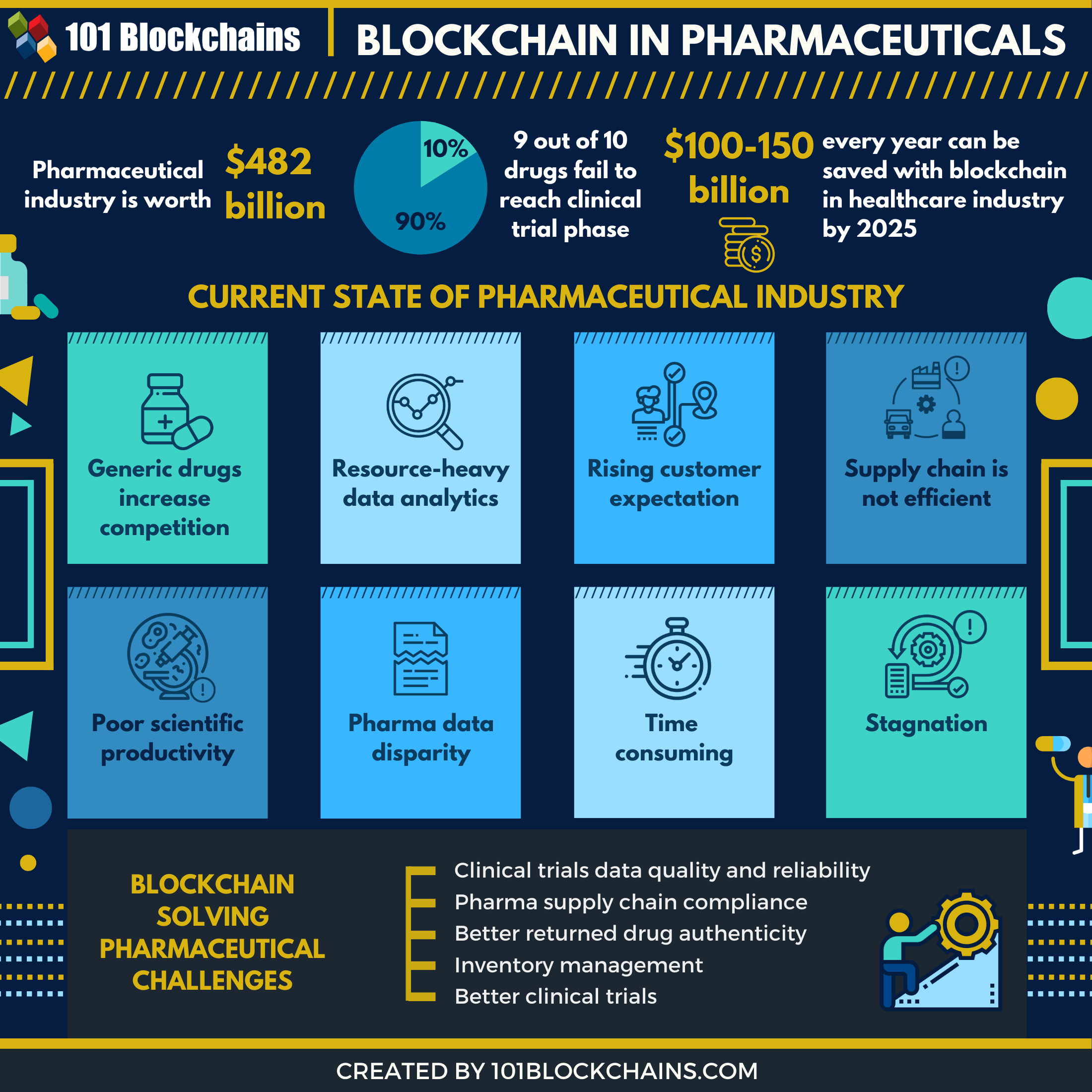Last updated on June 21st, 2023 at 04:44 pm
Blockchain technology has helped in the digital revolution of many industries, including the pharmaceutical industry. According to Statista, worldwide spending on blockchain solutions will rise to $5.9 billion by 2023.
Big Pharma is betting on blockchain technology to help enhance the industry’s performance, efficiency, transparency, and security. It will be interesting to see how much of this will be contributed by the big pharma companies.
This article will talk about the application of blockchain technology in the pharmaceutical industry and how some big pharma companies have already started adopting blockchain.
Let’s dive in!
Blockchain In Pharma: An Overview
The pharmaceutical industry faces a unique set of challenges, including effective supply chain management, one of the biggest challenges in every industry these days. In the pharma industry specifically, these challenges have resulted in a failure of many drugs passing through the clinical trial phase, as a result of which, these drugs never make it to the market. Such failures result in wasteful expenditure of billions of dollars, and most of these issues arise because of the lack of an efficient infrastructure that facilitates the smooth functioning of businesses.
Here’s an insightful infographic that talks about the current state of the pharmaceutical industry and some of the challenges that the adoption of blockchain technology can address.

Some of the challenges of the pharma industry that can be addressed through blockchain include:
- Lack of a modern approach to business
- Slow growth over the past few decades as a result of poor research and development efforts
- Supply chain management
- Large amounts of data are being generated which requires resource-heavy and time-consuming data analytics efforts
- Data disparity due to data being stored in silos
By implementing blockchain technology, the pharmaceutical industry can address these challenges as blockchain offers the following benefits:
- Traceability – Blockchain solutions are public and can be accessed by anyone involved in the process. Such a solution will help streamline the process by making the movement of drugs and medicines visible throughout the supply chain. Moreover, with improved traceability, the pharma industry can also benefit from optimizing the flow of goods and a better, more efficient stock management system.
- Transparency – Blockchain technology can help make the pharma industry more transparent by making the database and the supply chain publicly accessible. The transparency will also help all parties involved in the infrastructure to be accountable for their responsibilities. When a blockchain solution is implemented, any problem in the supply chain or database management system can be traced back to the problem source.
In addition to the benefits mentioned above, blockchain technology will also help make the pharma industry more secure, efficient, and affordable.
Use Cases Of Blockchain In The Pharma Industry
With a better understanding of the pharmaceutical industry and how it can benefit from using blockchain-based solutions, let’s look at the use cases of blockchain in the pharma industry.
1. Supply Chain Management
Maintaining the supply chain is arguably one of the biggest challenges to the pharma industry. This is because the supply chain in pharma is complicated and risky as it has to comply with many industry rules and regulations.
By using blockchain technology for supply chain management, the pharma industry can enhance the supply chain’s security, integrity, data provenance, and functionality. With a blockchain-powered supply chain, the pharma industry can:
- Reduce the supply of counterfeit drugs or medicine.
- Improve transparency and traceability of the supply chain.
- Ensure regulatory compliance.
- Improve cold-chain shipping efforts.
- Provide real-time access to data to all parties involved.
- Improve the security of the entire supply chain.
- Reduce expenses by removing the intermediaries involved.
2. Clinical Trials
Blockchain technology can significantly enhance the performance of clinical trials in the pharmaceutical industry. Let’s take a look at some of the ways blockchain can be integrated into clinical trials:
- Improve communication – Blockchain can safely store sensitive information about patients and also about the clinical trial. Since the data stored on a blockchain can be accessed by all the parties involved, it improves the communication between the patients and the company conducting the trial. This helps participants understand the processes and the risks of the clinical trial better.
- Tamper-proof storage of data – Being immutable, all the data stored on a blockchain is secure as it cannot be tampered with by anyone.
- Addresses the consent issue – Many clinical trials suffer from the consent issues such as unapproved forms, missing documents, inadequate data, etc. Blockchain addresses this by making the entire process transparent and traceable. Hence, a blockchain-powered clinical trial will be able to offer a satisfactory consent process.
- Enhanced security – Blockchain stores data on a distributed ledger that is spread across different parties. This makes the system more secure as even if someone hacks a part of the infrastructure, they will not be able to tamper with all the information as there is no single point of failure in the system.
- Data quality and reliability – As the data cannot be tampered with, it is more accurate, which helps make clinical trials more productive.
3. Data Management
Blockchain-powered solutions will make database management more efficient as it will facilitate the patients’ data and distribute it to all the different parties involved, such as insurance companies, research firms looking to collect data, etc.
Moreover, blockchain technology will empower patients as it will allow them to control their data and only share relevant information with parties that they want to share the data with.
Companies Using Blockchain Solutions In The Pharmaceutical Industry
Let’s take a look at some companies that are planning to or already using blockchain solutions to improve their service offerings:
1. Pfizer
Pfizer, a leading life sciences and healthcare company, and other stalwarts such as McKesson Corporation, AmerisourceBergen Corporation, and Premier Inc. are taking part in a MediLedger blockchain project to improve the complex process of chargebacks in supply chain management.
The protocol created by MediLedger aims to create a closed ecosystem that eliminates friction by connecting disparate parties and letting them track the drug’s every detail. It is also designed to help automate the contract reconciliation and chargeback processes.
Pfizer believes that this project will help them reduce costly errors in supply chain management. It will also enable them to run operations more efficiently, and more importantly, it will lower the cost of patient care.
2. Novartis
Attracted by the immutability aspect of blockchain technology, Dan Fritz and Marco Cuomo decided to use blockchain technology for Novartis’ operations. The company has been exploring blockchain solutions since 2016 and has run different proof of concept projects.
Currently, the company is primarily focused on a public-private partnership called the IMI Blockchain Enabled Healthcare program between the European Pharmaceutical Industry and the EU to explore using blockchain technology in healthcare.
Novartis is working on The Pharma Ledger project to reduce the costs and risks involved for any company looking to use blockchain. The first application of the ledger is to provide patients with electronic medical leaflets, which allow them to get updates in near real-time.
Cardinal Health
Cardinal Health partnered with Chronicled to use blockchain-powered solutions on the MediLedger Network to streamline its operations across the pharmaceutical supply chain. The company believes that using blockchain technology will enable them to offer a reliable and frictionless experience for pharmacies.
In Conclusion…
- While there are big names in the Pharma industry that are betting big on blockchain, overall, the pharma industry has been one of the slowest industries in adopting blockchain technology. Therefore, it is fair to say that blockchain implementation in pharma has only started, and there’s still a long way to go before we see mass adoption. However, there is no doubt that blockchain can solve some of the most significant issues companies faced in the pharmaceutical industry.
So, what do you think about the use of blockchain in the pharmaceutical industry? Are there any interesting use cases that we missed out on?
Comment below and let us know what you think!
If you would like to read more articles like this, follow DeFi Planet on Twitter and LinkedIn.





















